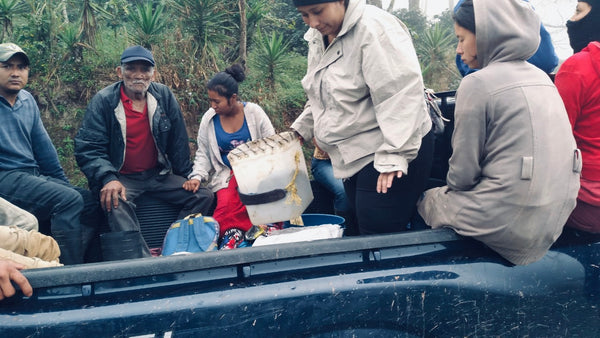
The Wake-Up Brew: Navigating towards a more equitable and sustainable future in the coffee industry?
A journey through the challenges, realities, and potential of Coffee production.
It's been really eye-opening for me to immerse myself in the complexities of the coffee industry. A real wake-up brew to think about its sustainability, challenges, and how the coffee industry impacts millions of people worldwide.

My first encounter with the coffee industry was as a young person growing up in Honduras, where I visited my first coffee plantation.I spent the day working on the coffee farm with people of all ages after travelling to the plantation for two hours on the back of a pick-up truck.At the time, I thought of this trip as a family outing as I helped the community with their hard work.

But, boy, was I wrong! The coffee industry is a billion-dollar industry that's more complex than a calculus equation.
This magical elixir. It's like the liquid gold that keeps the world turning, one sip at a time.
Coffee is more than just a drink; it's an institution and a way of life. It serves as a power source for our mornings, the inspiration for our conversations, and our secret weapon that keeps us going through long meetings.
Additionally, its production and trade generate significant income for millions of people around the world.
Since then, I've learned that the production of coffee depends on resources like land, water, labour, and capital. Who knew it was such a high-maintenance bean?
But despite all the arduous work that goes into producing coffee, the vast majority of profits are controlled by coffee roasters, traders, and retailers. So, in essence, coffee farmers work tirelessly so that we can enjoy our fancy lattes. Talk about an unfair trade!

International coffee prices have been declining for the past 20 years. Over this period, the revenue received by producing countries has decreased from 24% of the value in the mid-1990s to 16% in 2017. Additionally, in Honduras, the percentage of farmers who live in poverty rose by 20% in 2018.
This is despite all of the sector's sustainability initiatives and claims.
In essence, the coffee industry is brewing more than just coffee these days! It's a real wake-up call to learn that while we enjoy our delicious cups of joe, coffee farmers and workers are getting the short end of the stick. It's like they're stuck in a perpetual caffeine crash while roasters, traders, and retailers are buzzing with profits.
Well, let me tell you, producing coffee is not a walk in the park. In reality, it looks more like a bulldozer in a jungle! Natural environments are frequently destroyed by humans to create room for coffee plantations.
Don't even start me on the effects of pesticide use and monoculture farming on the environment. It's as if we're inviting biodiversity loss and soil erosion to join the party. But hey, at least we can sip a lovely cup of coffee as we ponder the consequences, right?

Oil painting of Honduran coffee farmers inspired by Totonho
My relationship with coffee has changed since I first started my adventure. It's complicated, it's messy, and it's unpredictable. I occasionally become motivated by the coffee industry's potential to fight poverty and do good. But more often than not, the sector's inequities and disparities are enough for me to want to throw a coffee pot over someone's head. But then, isn't that simply how love works?

Picture this: a group of coffee farmers waking up at the crack of dawn to begin their long journey to work. But, instead of a picturesque landscape and smiling faces, what they actually encounter are dangerous working conditions, long hours, and meagre compensation. It's like a twisted version of "The Wizard of Oz." Instead of finding a magical land of wonder, they're left with the harsh reality of the coffee industry. The conditions they face are far from ideal, and it's time for large corporations to stop pretending everything is sunshine and rainbows.

The coffee farmers inspired by Gustav Klimt
I've come to understand that the coffee industry resembles a giant game of Monopoly, with a few players hoarding all the money and assets. The others, on the other hand, find it difficult to survive. Unfortunately, like in Monopoly, those who are winning are also reluctant to change the game's rules.
But, I remain optimistic that we can make the coffee industry more sustainable with cooperation, creativity, and a fair distribution of profits. Giving smallholder farmers and employees a seat at the table and ensuring their voices are heard would accomplish this.

I've come to the conclusion that the coffee industry needs a makeover. We need to take a more sustainable approach to coffee farming and distribution. Because, let's face it, we can't live in a world without coffee.
We certainly can't live in a world where coffee farmers live below the poverty line. So, it's time to bring some love to the coffee industry and create a more equitable and sustainable future. So, let's raise a cup of coffee to that! Cheers!
And this is what you can do to join the movement.
- Choose sustainable coffee: By choosing coffee companies that prioritize price transparency, you can make a positive impact on the industry and support sustainable practices.
- Support smallholder farmers: If possible, consider purchasing coffee directly from smallholder farmers to provide them with fair compensation and support their livelihoods.
- Spread awareness: Help make a difference by educating your friends and family about the challenges faced by coffee farmers and the importance of sustainability in the industry.
- Advocate for change: Let's work together to demand more equitable and sustainable practices in the coffee industry and push for positive change.
- Appreciate the value of coffee: Take a moment to savour and appreciate the rich history and cultural significance of coffee, and its role in connecting people across the world.





